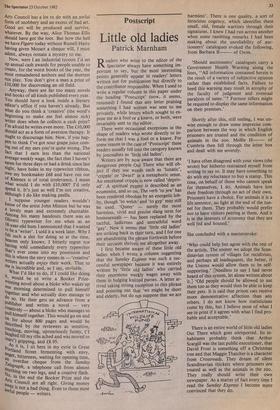Postscript
Little old ladies
Patrick Marnham
Readers who write to the editor of the Spectator always have something im- portant to say, but the most interesting points generally appear in readers' letters written not for publication but directly to the contributor responsible. When I used to write a regular column in this paper under the heading `Postscript' (now, it seems, resumed) I found that any letter praising something I had written was sent to me privately, while letters which sought to ex- pose me as a fool or a knave, or both, were invariably sent to the editor.
There were occasional exceptions in the shape of readers who wrote directly to in- form me that I was a fool or a knave. For some reason in the case of `Postscript' these readers usually fell into the category known by journalists as `little old ladies'.
Writers are by now aware that there are dangerous people Out There who will ob- ject if they use words such as `lunatic', `cripple' or `dwarf' in a metaphoric sense. An emotional cripple is now called 'depriv- ed'. A spiritual pygmy is described as an ecumenist, and so on. The verb `to jew' has been rendered obsolete by an energetic lob- by, though `to welsh' and `to gyp' may still be used. `Queer' — surely the most harmless, vivid and precise slang term for homosexuals — has been replaced by the tactful, ludicrous and untruthful word `gay'. Now it seems that 'little old ladies' are striking back in their turn, and I for one am abandoning the phrase forthwith before their sarcasm shrivels me altogether away.
I first became aware of these little old ladies when I wrote a column suggesting that the Sunday Express was such a suc- cessful newspaper because it was entirely written by `little old ladies' who carried their enormous weekly wages away with them in bulging knitted purses. A letter ar- rived taking strong exception to this phrase and pointing out that `we might be short and elderly, but do not suppose that we are
harmless'. There is one quality, a sort of ferocious cogency, which identifies these small, old, female warriors through their signatures. I knew I had run across another when some rambling remarks I had been making about the unreliability of auc- tioneers' catalogues evoked the following, from Barbara B of Oxon.
`Should auctioneers' catalogues carry a Government Health Warning along the lines, "All information contained herein is the result of a variety of subjective opinion rather than established facts. Failure to heed this warning may result in atrophy of the faculty of judgment and eventual paralysis of same."? Fortune tellers might be required to display the same information on their premises.'
Shortly after this, still reeling, I was un- wise enough to draw some imprecise com- parison between the way in which English prisoners are treated and the condition of animals in the zoo. Mollie H of Cumbria then fell through the letter box and dealt with me severely.
`I have often disagreed with your views (she wrote) but hitherto restrained myself from writing to say so. It may have something to do with my reluctance to buy a stamp. This time, on behalf of those who cannot speak for themselves, I do. Animals have lost their freedom through no act of their own. Prisoners have a choice. For animals it is a life sentence, no light at the end of the tun- nel for them. They probably would prefer not to have visitors peering at them. And it is in the interests of economy that they are well fed and housed.'
She concluded with a masterstroke: `Who could help but agree with the rest of the article. The sooner we adopt the Scan- dinavian system of villages for recidivists, and perhaps all inadequates, the better, if the Unions would allow them to be self- supporting.' [Needless to say I had never heard of this system, let alone written about it.] 'Old people should be allowed to use them too as they would then be able to keep their pets. It is said that prison cats receive more demonstrative affection than any others. I do not know how statisticians come by this, but I believe most of what I see in print if it agrees with what I find pro- bable and acceptable.'
There is an entire world of little old ladies Out There which goes unreported. Its in- habitants probably think that Arthur Scargill was the last public executioner, that David Frost is something off a Christmas tree and that Maggie Thatcher is a character from Crossroads. They dream of silent Scandinavian thickets where prisoners are treated as well as the animals in the zoo. They really should write their own newspaper. As a matter of fact every time I read the Sunday Express I become more convinced that they do.










































 Previous page
Previous page